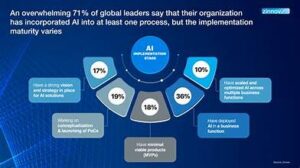
In the fast-evolving business landscape, Artificial Intelligence (AI) has emerged as a pivotal force in shaping corporate strategy. Companies are increasingly leveraging AI to drive strategic decisions, enhance operational efficiency, and gain a competitive edge. This article explores how AI is transforming business strategy and provides insights into its applications, benefits, and future trends.
The Role of AI in Corporate Strategy
Artificial Intelligence, with its ability to analyze vast amounts of data and generate actionable insights, is revolutionizing how businesses formulate and execute their strategies. Traditional business strategies relied heavily on historical data and intuition. However, AI introduces a data-driven approach, allowing companies to make more informed and timely decisions.
Data-Driven Insights
AI algorithms excel in processing large datasets to uncover patterns and trends that might be missed by human analysts. Machine learning models, for example, can predict customer behavior, market trends, and operational risks with high accuracy. This capability enables businesses to anticipate changes in the market and adapt their strategies accordingly.
Enhanced Decision-Making
AI-powered tools provide executives with real-time insights and recommendations, enhancing their decision-making processes. Predictive analytics, a subset of AI, helps businesses forecast future trends and outcomes based on historical data. This foresight allows companies to proactively address potential challenges and seize new opportunities.
Applications of AI in Strategic Decision-Making
The integration of AI into strategic business decisions manifests in several key areas:
1. Market Research and Analysis
AI tools can analyze consumer sentiment, track social media trends, and evaluate market conditions more efficiently than traditional methods. By leveraging Natural Language Processing (NLP), companies can gain a deeper understanding of customer preferences and market dynamics. This information is crucial for developing targeted marketing campaigns and product innovations.
2. Financial Forecasting
AI enhances financial forecasting by analyzing historical financial data and economic indicators. Machine learning models can predict revenue, expenses, and cash flow with greater precision. This accuracy helps businesses plan their budgets, manage risks, and optimize investment strategies.
3. Supply Chain Optimization
AI improves supply chain management by predicting demand, optimizing inventory levels, and identifying potential disruptions. Predictive analytics helps companies forecast demand patterns and adjust their supply chain strategies to minimize costs and enhance efficiency.
4. Customer Relationship Management (CRM)
AI-driven CRM systems provide personalized customer experiences by analyzing customer interactions and preferences. Chatbots and virtual assistants, powered by AI, handle customer inquiries and support, improving response times and customer satisfaction.
Benefits of AI in Business Strategy
The adoption of AI in corporate strategy offers several advantages:
1. Improved Efficiency
AI automates repetitive tasks, allowing employees to focus on more strategic activities. This automation leads to increased operational efficiency and reduced operational costs. For example, AI can streamline data processing, report generation, and customer service operations.
2. Competitive Advantage
Companies that effectively harness AI gain a competitive edge by making more informed decisions and responding faster to market changes. AI-driven insights enable businesses to stay ahead of competitors by identifying emerging trends and opportunities before others.
3. Enhanced Accuracy
AI algorithms reduce the likelihood of human error by providing data-driven recommendations and forecasts. This accuracy is crucial for strategic planning and risk management, ensuring that decisions are based on reliable information.
4. Scalability
AI solutions are scalable and can be adapted to meet the needs of businesses of all sizes. As companies grow, AI systems can handle increasing volumes of data and complex analyses, supporting strategic decisions across various business functions.
Challenges and Considerations
While AI offers numerous benefits, it also presents challenges that businesses must address:
1. Data Privacy and Security
The use of AI involves handling large volumes of sensitive data. Ensuring data privacy and security is paramount to protect against breaches and misuse. Companies must implement robust data protection measures and comply with relevant regulations.
2. Integration with Existing Systems
Integrating AI with existing business systems can be complex and costly. Businesses need to carefully plan and execute the integration process to ensure that AI solutions align with their current infrastructure and workflows.
3. Skill Gaps
The effective use of AI requires specialized skills and expertise. Companies may face challenges in recruiting and retaining talent with the necessary AI knowledge and experience. Investing in training and development is essential to build an AI-capable workforce.
Future Trends in AI and Business Strategy
The future of AI in business strategy is poised for continued growth and innovation. Key trends to watch include:
1. Increased Use of AI in Decision Support Systems
AI will play a more prominent role in decision support systems, providing executives with advanced tools for scenario analysis and strategic planning. As AI technology evolves, these systems will offer even more sophisticated insights and recommendations.
2. Greater Emphasis on Explainable AI
As AI becomes more integrated into decision-making processes, there will be a growing emphasis on explainable AI. Businesses will seek AI solutions that provide transparent and understandable explanations for their recommendations and decisions.
3. Expansion of AI Applications
AI applications will expand across various business functions, including human resources, marketing, and product development. Companies will explore new ways to leverage AI to drive innovation and enhance their competitive position.
4. Ethical and Responsible AI
The ethical use of AI will become increasingly important. Businesses will focus on developing and implementing responsible AI practices to ensure fairness, transparency, and accountability in their AI-driven strategies.
Conclusion
Artificial Intelligence is reshaping the future of corporate strategy by providing data-driven insights, enhancing decision-making, and driving operational efficiency. As businesses continue to harness AI, they will gain a competitive edge, improve accuracy, and achieve greater scalability. However, addressing challenges such as data privacy, integration, and skill gaps will be crucial for successful AI implementation. By staying abreast of future trends and adopting responsible AI practices, companies can navigate the evolving landscape and leverage AI to achieve strategic success.

